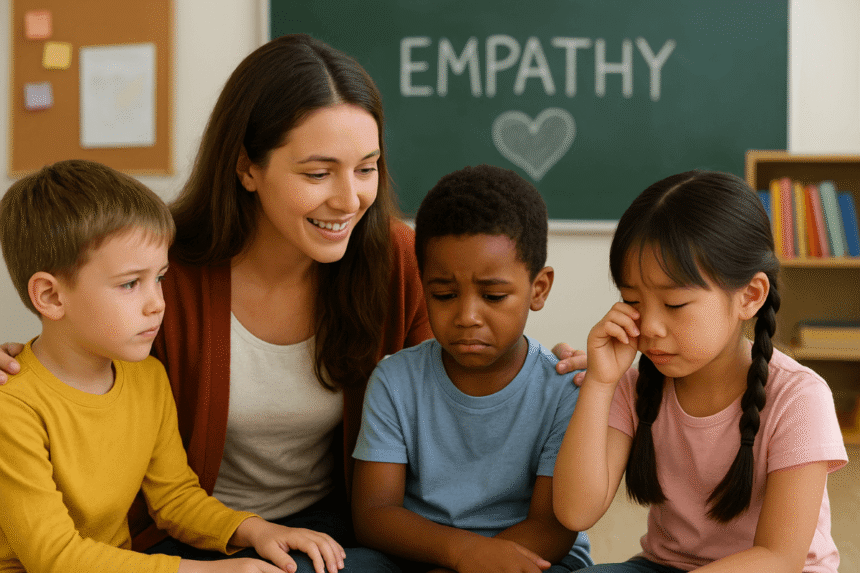Teaching children about empathy is one of the most powerful gifts we can give the next generation.
Empathy helps children understand emotions, connect with others, and respond with kindness and respect.
In a world filled with distractions and screens, empathy reminds children what it means to be human. It teaches them to pause, listen, and care. When empathy is practised early, it becomes a lifelong strength.
Empathy doesn’t appear overnight. It’s a learned skill — one that develops slowly through love, modelling, and meaningful conversations.
What Is Empathy in Children?
Empathy is more than being nice or polite. It is the ability to understand and share another person’s feelings. It means seeing the world through someone else’s eyes.
For children, empathy starts small. It might look like sharing toys, comforting a crying friend, or showing concern when someone gets hurt. Over time, these small moments shape character.
When we are teaching empathy to kids, we are helping them:
- Recognise emotions — both their own and others’.
- Understand different perspectives.
- Respond with care and compassion.
Example:
A five-year-old who offers a tissue to a classmate who’s crying is showing early empathy.
They see sadness. They want to help. That’s where empathy begins.
“Empathy is a strange and powerful thing. There is no script. There is no right way or wrong way to do it. It’s simply listening, holding space, withholding judgment, emotionally connecting, and communicating that incredibly healing message of “You’re not alone.” – ― Brené Brown, Daring Greatly: How the Courage to Be Vulnerable Transforms the Way We Live, Love, Parent, and Lead
Why Teaching Empathy to Children Matters?
Empathy is at the heart of emotional intelligence. It helps children build strong relationships, communicate clearly, and handle conflicts peacefully.
Without empathy, it’s easy for children to become self-focused or disconnected. With empathy, they learn connection, kindness, and responsibility.
When teaching children about empathy, we’re not just shaping how they treat others — we’re shaping how they see the world.
Here’s why it matters so much:

1. It Creates Stronger Relationships
Empathy helps children form bonds that last. It encourages trust, cooperation, and mutual respect.
Children who understand feelings make better friends and partners in teamwork. They know when to listen, when to comfort, and when to step back.
Example:
During a group activity, a child who notices a shy classmate being quiet might say,
“Do you want to share your idea?”
That’s empathy in action — noticing, including, caring.
2. It Improves Communication Skills
When children learn to understand feelings, they become better listeners. They pause before speaking. They ask questions. They care about responses.
Empathetic children often use phrases like “I understand” or “That must feel hard.” These small words create emotional connection and trust.
Tip:
Encourage your child to talk about feelings every day — their own and others’.
Ask, “How did your friend feel?” or “What could you do to help?”
3. It Reduces Bullying and Aggression
Empathy is one of the strongest antidotes to bullying. Children who can imagine how others feel are less likely to cause harm — and more likely to speak up for what’s right.
Example:
When a child sees a peer being teased and says, “Stop, that’s not fair,” they are showing courage guided by empathy.
Schools that promote empathy report fewer behavioural problems, more cooperation, and happier classrooms.
4. It Encourages Inclusivity and Respect
The world is full of differences — in culture, beliefs, abilities, and appearance.
Empathy teaches children to value those differences instead of fearing them.
When we help children understand diversity, we prepare them to live and work in a global world with kindness and respect.
As Maya Angelou beautifully said,
“I think we all have empathy. We may not have enough courage to display it.”
Empathy gives children the courage to be kind, fair, and inclusive, even when others are not.
5. It Builds Problem-Solving Skills
Empathetic children are great problem solvers. They don’t just think about what they want — they think about how everyone feels.
In disagreements, they look for solutions that make sense for all sides. This skill helps in friendships, teamwork, and future leadership.
Example:
Two children fighting over a toy might be guided to ask,
“How can we both use it?”
That simple question shifts focus from conflict to cooperation.
The Benefits of Teaching Children Empathy
The benefits of empathy reach every area of a child’s life — from home and school to future workplaces and relationships.
Here’s how empathy helps children grow into balanced, confident, and emotionally intelligent adults.

1. Builds Emotional Intelligence
Children who understand emotions can handle them better. They learn to recognise anger, sadness, excitement, and fear — without being overwhelmed.
Example:
A child who says, “I’m angry, but I need a break,” has learned emotional control through empathy.
Tip:
Name feelings often: “You look frustrated.” “You seem proud.”
When children can identify emotions, they can manage them more calmly.
2. Strengthens Friendships and Family Bonds
Empathy helps children connect deeply with others.
They become better friends, siblings, and team members.
When kids can see things from another person’s view, they handle disagreements with patience and care.
Example:
A child who gives up a turn at a game so someone else can play is learning that kindness feels good — not just to others, but to themselves.
3. Reduces Bullying and Teasing
Empathy teaches compassion instead of cruelty. Children who understand feelings think twice before teasing or excluding others.
Tip:
Watch shows or read stories together, then ask, “How do you think that character felt?”
This helps your child think about emotions in different situations.
Example:
In a playground scenario, if one child falls, the empathetic child helps instead of laughing.
That small moment can create a ripple of kindness across a group.
4. Builds Leadership and Teamwork Skills
Empathetic children often grow into thoughtful leaders. They listen before they act and care about people as much as results.
When children learn empathy early, they learn to inspire and motivate others with kindness rather than fear.
Example:
During a school project, a child who checks that everyone’s ideas are heard shows early signs of emotional leadership.
5. Promotes Mental Well-Being
Empathy helps children feel connected, understood, and supported. It reduces loneliness and anxiety by building a sense of belonging.
When kids care for others and receive care in return, they experience emotional safety — one of the strongest foundations for happiness.
Tip:
Encourage gratitude and reflection. Ask, “What was one kind thing you saw today?”
It helps children focus on positivity and connection.
How to Teach Empathy to Children?
Empathy doesn’t grow automatically. It needs guidance, modelling, and consistent practice.
Here are effective strategies for teaching empathy to kids — at home, in class, or anywhere they interact with others.
1. Model Empathy Every Day
Children learn empathy by watching you.
They notice how you talk to others, how you react when someone is upset, and how you manage frustration.
Show care in small, visible ways — offering help, saying kind words, or simply listening.
Example:
If your child spills milk, respond with patience instead of anger. Say, “That’s okay, let’s clean it up together.”
They learn that empathy includes forgiveness and calmness.
2. Encourage Perspective-Taking
Ask your child to imagine what others might feel. This helps them step outside their own experience.
Questions to ask:
- “How do you think your teacher felt when everyone was talking?”
- “What do you think your friend needed when they were sad?”
Perspective-taking builds emotional awareness and compassion.
3. Teach Emotional Vocabulary
Children can’t show empathy if they don’t have words for feelings. Help them name emotions through daily conversation.
Example:
“You look disappointed. Did something not go the way you hoped?”
Use storybooks, pictures, or even emojis to discuss emotions visually.
Tip:
Create a “feelings chart” at home or school.
Encourage children to point to how they feel each day.
4. Use Stories and Books About Empathy
Stories are powerful teachers. They let children see the world through another person’s experience.
Recommended Books:
After reading, ask questions like:
“What made the character sad?” or “How would you help if you were there?”
5. Praise Empathetic Behaviour
Positive reinforcement works wonders. When children act kindly or thoughtfully, acknowledge it immediately.
Example:
“That was kind of you to share your toy when your cousin was sad.”
This recognition helps them understand that empathy matters and feels rewarding.
6. Create Opportunities for Empathy Practice
Empathy grows through experience. Encourage your child to help, volunteer, or participate in caring acts.
Examples:
- Feed the stray animals together.
- Write thank-you notes to teachers or helpers.
- Visit grandparents and listen to their stories.
These real-world experiences show empathy in action.
Parenting With Empathy And Emotional Intelligence
Empathy in Schools and Communities
Schools play a crucial role in teaching empathy to children.
When classrooms value emotions as much as academics, children thrive.
Educators can integrate empathy through:
- Cooperative group projects.
- Peer mentoring programs.
- Discussions about kindness, fairness, and respect.
When empathy becomes part of the culture, children feel safe, supported, and motivated to learn.
Challenges in Teaching Empathy
Teaching empathy isn’t always easy. Some children struggle with understanding feelings — especially if they’re very young or come from stressful environments.
Tips to overcome challenges:
- Be patient. Empathy takes time.
- Use gentle correction instead of punishment.
- Praise progress, not perfection.
Every small effort counts. Every kind moment adds up.
As the Dalai Lama wisely said,
“Love and compassion are necessities, not luxuries. Without them, humanity cannot survive.” – ― Dalai Lama XIV, The Art of Happiness
Conclusion
Teaching children about empathy is one of the most powerful ways to shape a better world.
It builds emotional intelligence, respect, and compassion — qualities that last a lifetime.
Empathy helps children not only understand others but also understand themselves.
It makes them better friends, better learners, and eventually, better leaders.
So let’s start early.
Let’s model empathy in our homes, schools, and communities.
Because when we teach empathy to children, we don’t just raise kind individuals — we raise a kinder generation.
5 FAQs about Teaching Children About Empathy
1. What is empathy, and why is it important for children?
Empathy is the ability to understand and share another person’s feelings. For children, empathy builds emotional intelligence, improves relationships, and reduces conflict. It helps them connect, care, and communicate more effectively with others.
2. At what age should I start teaching my child empathy?
Empathy can be introduced as early as age two or three. At this stage, children begin to notice others’ emotions. Simple actions — like sharing toys, identifying feelings, or comforting someone — help nurture empathy from a young age.
3. How can parents teach empathy at home?
Parents can teach empathy by modelling it daily. Listen to your child’s feelings, discuss emotions openly, read books about kindness, and praise caring behaviour. Small actions, like helping a friend or thanking others, reinforce empathy naturally.
4. Can empathy be taught in schools?
Yes! Schools play a vital role in teaching children about empathy. Group projects, classroom discussions, and kindness programs help students understand others’ perspectives and build social awareness. Teachers can lead by example and create an inclusive culture.
5. What are the long-term benefits of empathy in children?
Children who learn empathy grow into compassionate, confident adults. They develop stronger social skills, better communication, and healthier relationships. Empathy also promotes teamwork, leadership, and emotional well-being throughout life.
Thank you for taking the time to explore this post. I hope you found it both insightful and enjoyable.
Remember, your sharing can make a positive impact! Please share this post across your social media and other networks, allowing others to gain from its content.
PVM

Mathukutty P. V. is the founder of Simply Life Tips, a blogger, content writer, influencer, and YouTuber passionate about learning and sharing. Guided by “Simple Living, Creative Thinking,” he believes in the power of knowledge sharing and lifelong learning.







